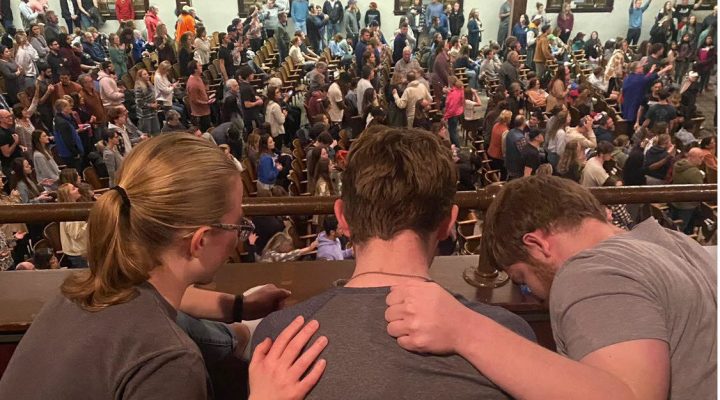“If the only tool you have is a hammer, it is tempting to treat everything as if it were a nail,” said American psychologist Abraham Maslow in 1966. Many of us have probably tried — and failed — to tackle a problem with the tools available to us. Our ability to respond to the challenges that confront us can be limited by our toolset.

Andrew Garnett
Leadership scholar Ronald Heifetz has expanded on this concept and has written extensively about the difference between technical challenges and adaptive challenges. Technical challenges are those that can be tackled if the right skills are available. The solutions are often apparent, and people are typically receptive to technical solutions.
For example, a pilot faces a technical challenge in successfully landing an airplane. Landing a plane requires great training and skill, and for the passengers on the plane much is at stake in managing the challenge successfully. Yet the answer to the challenge is clear — the plane that is in the air needs to end up on a runway. Furthermore, the skill set necessary to overcome the challenge is well known. Even if we all can’t land an airplane, aeronautics is a well-established field and there are people who understand very well how to do so.
Adaptive challenges, on the other hand, are more complicated. It may be clear there is a problem, but we are unsure exactly what the problem is.
“Often there is no amount of technical training that can solve an adaptive challenge.”
Adaptive challenges are multifaceted or cross-disciplinary, so they are more complex to solve. Often there is no amount of technical training that can solve an adaptive challenge. This may be because the problem is not amenable to a technical solution, but it also can be because no one has faced the problem before and so there are no known solutions.
Typically, these challenges can be overcome only by transforming our mindset. To overcome an adaptive challenge, we must learn to think differently about reality itself.
People may not only resist the solutions to adaptive challenges, they may resist even acknowledging that an adaptive challenge exists. To overcome a technical problem is easier and less threatening than an adaptive challenge.
One of Heifetz’s key insights is that we often try to solve an adaptive challenge with a technical solution. This will never work, and it can occasionally have disastrous results.
“The Gospels are full of occasions when Jesus corrects technical thinking with adaptive thinking.”
The Gospels are full of occasions when Jesus corrects technical thinking with adaptive thinking. In John 3, Jesus tells the Jewish religious leader Nicodemus he must be born again. Nicodemus assumes this is a technical problem that requires a gynecological solution: “How can anyone enter a second time into the mother’s womb and be born?” Jesus counters with adaptive thinking and explains he is speaking about an entirely new kind of birth.
In John 4, Jesus has a long conversation with a Samaritan woman sitting beside a well. As the conversation goes on, the woman begins to sense that Jesus might be a prophet. Samaritans had different worship practices than Jews like Jesus, so the woman asks Jesus about the correct mountain on which to worship God. She views worship as a technical challenge — her assumption is that worship as it exists in first century Palestine is fundamentally acceptable and what is necessary is to get the details correct.
Jesus again responds adaptively and frames the practice of worship in an entirely new way: “Woman, believe me, the hour is coming when you will worship the Father neither on this mountain nor in Jerusalem. … But the hour is coming and is now here when the true worshipers will worship the Father in spirit and truth, for the Father seeks such as these to worship him.”
In Mark 3, Jesus’ family sets out to bring him home, thinking Jesus has lost his mind. They arrive at the house where Jesus is teaching but cannot get into the house because of the large crowds. Members of the crowd send word to Jesus that his mother and brothers are outside and want to speak to him. To bystanders, this is an issue of family conflict; it is a technical problem for a counselor or therapist to fix. But Jesus, as always, responds adaptively: “Who are my mother and brothers? Whoever does the will of God is my brother and sister and mother.”
“Jesus excelled as an adaptive thinker.”
Jesus excelled as an adaptive thinker. While there are many times in which we do need to use our knowledge, skills and training to solve problems, Jesus strove to show us that many of our deepest challenges can be addressed only by an entirely new way of thinking. We have to step out of our own perspective, think systemically and grow into a greater level of awareness. In short, we need to learn to see as God sees.
What does all this have to do with the much-discussed Asbury revival and its offshoots at other college campuses? Most of the discussion in this moment has been technical rather than adaptive:
- How does the Asbury revival compare to other revivals of the past? This is a technical approach from the field of church history.
- Does the Asbury revival bear the marks of “true revival”? This is a technical question with answers in the field of discipleship and spiritual growth.
- Is the theology sound? Another technical approach from the perspective of theological studies.
These are all valid questions to ask, and I am appreciative that we have experts in these fields to offer their perspective. But are these the only questions we should be asking? Are there not deeper questions we might explore — questions that begin to take us to the adaptive challenges of the church in 2023?
An adaptive approach might have us wonder:
When younger adults are the least likely demographic to attend worship in a traditional church setting, why have they become so captivated with worship in this space?
When seminary attendance is declining, and those who do enroll in a seminary are less interested in leading worship in a congregational setting, why are so many nameless young adults interested in leading worship here?
If social media has encouraged us to show only the best parts of ourselves, what about the Asbury revival has caused the surge in confession and personal testimony?
These are all deeper questions, and many are cross-disciplinary questions. Most probably do not have easy answers. But aren’t these the kinds of questions the Jesus of the Gospels would want us to ask?
Andrew Garnett serves as pastor of Hampton Baptist Church in Hampton, Va.
Related articles:
Asbury University closes down revival that clogged small Kentucky town
About the Asbury ‘revival’: Time will tell | Opinion by Mark Wingfield
What I witnessed this week at the Asbury revival | Analysis by Laura Levens
‘Something wonderful and of God is happening at Asbury,’ church historian believes | Analysis by Joseph Early
Questions to ask while pondering if Asbury is hosting a ‘true revival’ | Analysis by Rick Pidcock


